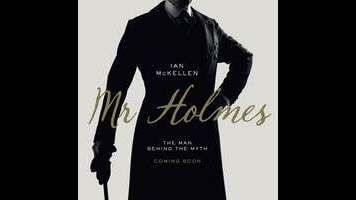Ian McKellen is an aged Sherlock in the stolid Mr. Holmes

It’s easy to imagine Ian McKellen playing Sherlock Holmes with a Gandalfian twinkle in his eye, but the first glimpse of him in the title role of Mr. Holmes betrays no such delights. Sitting on a train car opposite a little boy, lips slightly pursed and pulled down into a little frown, he admonishes the child not to tap the window. The boy wonders how he knew that’s what he was about to do. This is what Sherlock Holmes has been reduced to: predicting the behavior of dull-witted children, performing what someone else in the movie refers to as his “parlor trick.”
McKellen’s Holmes perks up slightly when he arrives at his estate, where the less dull-witted Roger (Milo Parker), the young son of housekeeper Mrs. Munro (Laura Linney), takes an interest in both Holmes’ past as a brilliant detective and his present as an elderly beekeeper (a detail taken from one of the last Arthur Conan Doyle stories). With Roger’s encouragement, Holmes tries to re-solve a mystery from his past: his last case, which he struggles to remember and write down as it happened, not the way it’s been told by others. Like Gods And Monsters, McKellen’s previous teaming with writer-director Bill Condon, the film toys with the “real” life behind an icon—but unlike director James Whale, this McKellen character didn’t actually exist, even in a version that forgoes the iconic pipe and deerstalker hat.
Though its central mystery isn’t from the Doyle canon, Mr. Holmes is still a literary adaptation, based on the novel A Slight Trick Of The Mind by Mitch Cullin, who also wrote the book that became Terry Gilliam’s film Tideland. The stylistic similarities between Condon and Gilliam are few and far between, but both films do involve a child fascinated by a world of fantasy. In the case of Holmes, that world isn’t so far-fetched; here, the stories about Holmes that Roger loves are fictionalized exploits of an actual detective, written by his friend John Watson. (Essentially, this is a universe where Watson is Doyle.)
It’s a clever conceit, as is the idea of a Sherlock Holmes sifting through his past as his memory falters, as nearly all human memories must. Condon skips around, from Holmes in his 90s on his estate to his recent trip to Japan to the time of his last case (supposedly 35 years earlier, though even with McKellen aged up considerably, the gap looks more like 10 or 15). The cutting around to different melancholic time periods disguises, for a while, the unavoidable fact that the complexity of this case isn’t especially worthy of the Holmes name. When discussing its status with Roger, Holmes notes that it’s not unsolved, but “more I’m trying to remember it”—which may be why it holds little urgency as a mystery.
For a while, the movie holds some promise as something else: a looking-glass reflection of the Holmes mythos with a bittersweet interplay between cherished fictions and sadder realities. Though purportedly less outlandish than the Doyle (or “Watson”) stories, the movie’s real world still has its meta moments, where Holmes can go to the movies and see a further fictionalized version of himself on-screen and Roger can ask him about his instantaneous deductive background checks. McKellen, always a pleasure, cuts through much of the treacle inherent in an oldster/youngster bonding story, and the Roger character disposes of the rest through his sometimes cruel disdain for his working-class mother, along with his requisite intelligence and pluck.
But Linney, stuck in the role of worried woman, spends most of the movie with a “What’s going on here?” look on her face, and the ultimate answer to her perpetual question is: Not all that much. Condon makes professional, polished films that often boast good performances, but there’s something a little stolid and square about his work and those qualities are especially noticeable as he adapts such potentially idiosyncratic material. Mr. Holmes has moments of palpable regret and loss, but visually speaking, it looks like a blandly touching movie about a lonely old man who befriends a scrappy kid and learns about the magic of storytelling. Eventually, that’s the unexciting destiny it fulfills.